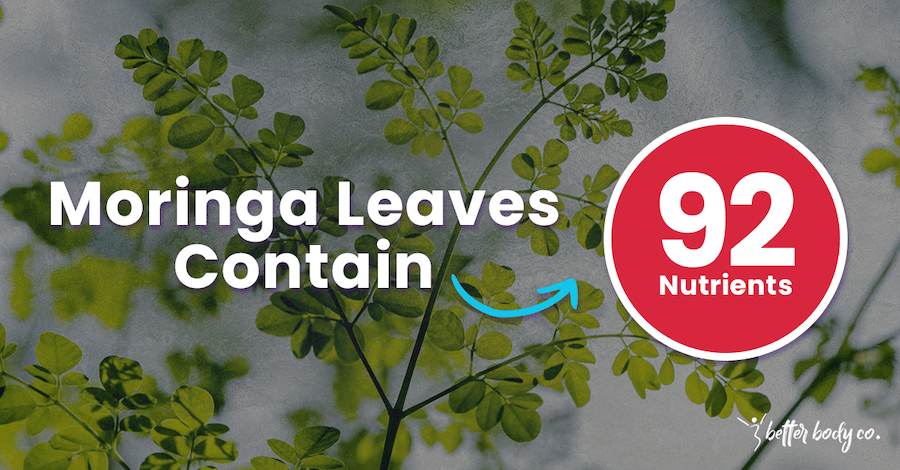Best Tendonitis Treatment For Women Over 40 (2024)
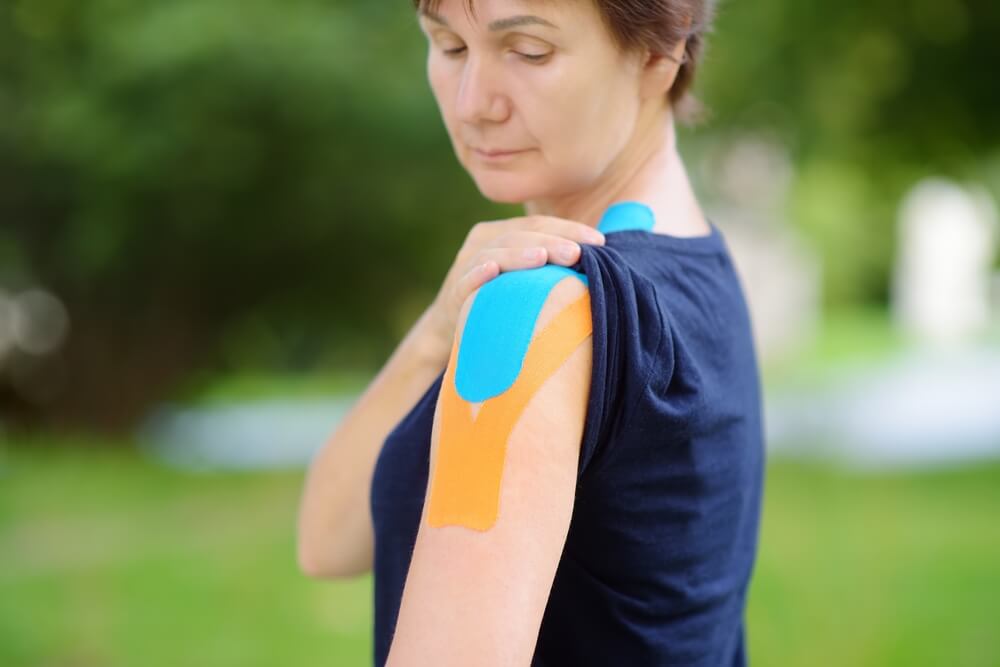
Your tendons are the flexible tissue that anchor your bones to your muscles. They help you stretch, jump, climb, and run.
When you do the same activity too often without a break, your tendons get worn out. This can stop you in your tracks. The clinical term for this is tendonitis.
If you’re a woman over the age of 40, you have a higher risk of developing tendonitis. If you were an athlete, your risk is even higher.2
If you’re worried about tendonitis, you’re in the right place. We’ve rounded up the best full-text articles and journals from medical databases so in just the next 5 minutes, you will discover:
- The 5 most common types of tendonitis
- 3 preferred treatment methods to recover from tendonitis
- Our research-based recommendations to help you recover and keep tendonitis away
Types of Tendonitis: What Type Do You Have?
Patellar tendonitis will cause discomfort behind your lower kneecap. This pain may get worse when you bend, straighten your leg, or jump.4
This type of tendonitis causes pain along your outer ankle and lower leg. Your ankle may look swollen or red.5
Rotator cuff tendonitis causes pain and swelling in the front of your shoulder. It may get worse when you reach or lift objects.6
You may develop tendonitis in your biceps, wrists, or elbows. The pain will start gradually, but may become more uncomfortable with use.7
Tendonitis Causes Especially For Women Over 40
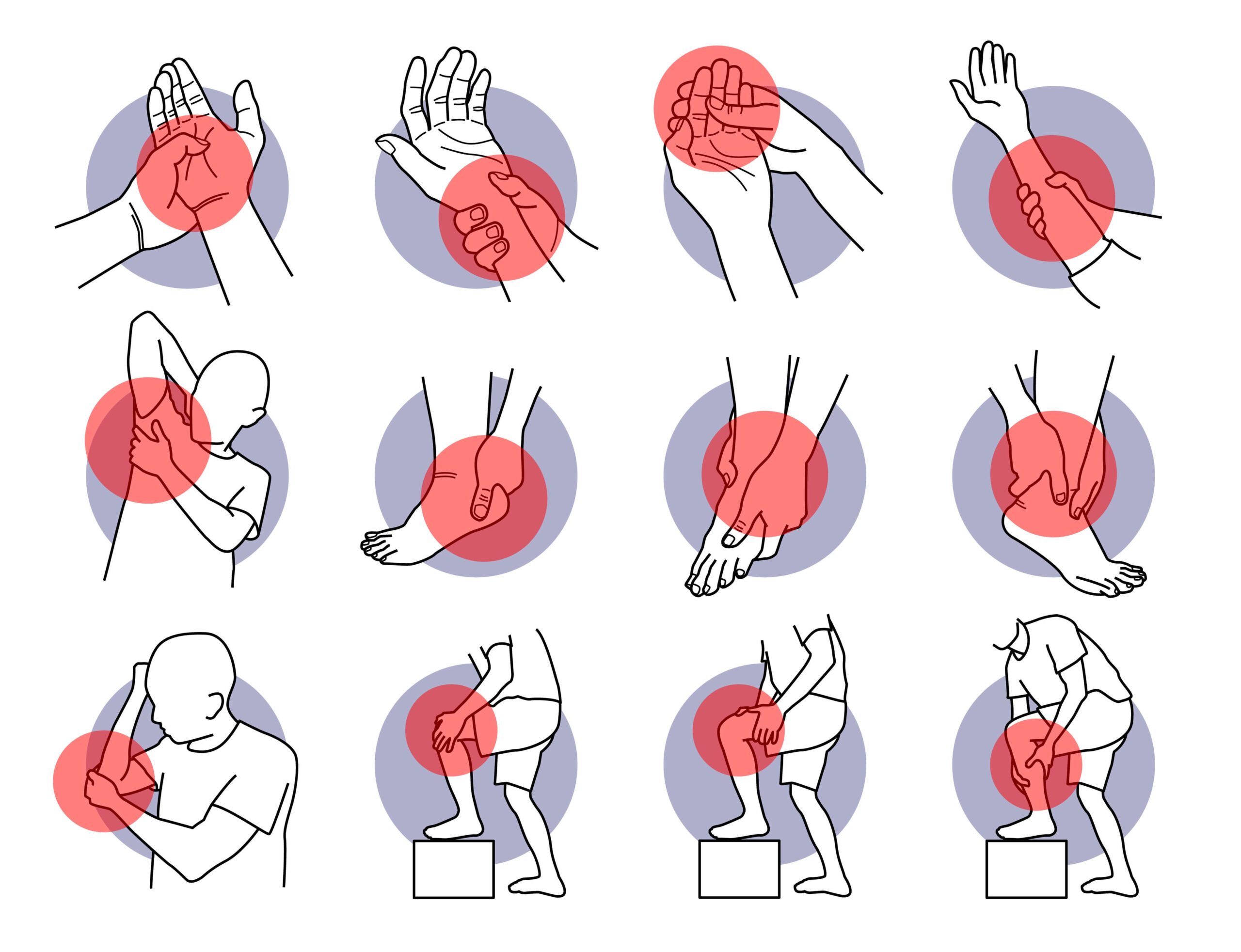
Turns out, tendonitis is caused by inflammation of the thick fibrous cords that attach our muscles to bone.
Most people assume that tendonitis happens in men most of the times, but emerging research is proving them wrong.
Such injuries actually affect women more than men (as high as SIX times, according to Harvard).8
One key reason is hormonal changes due to menopause.
Menopause – Estrogen levels fall during menopause and this can start as early as 40 during the first phase – perimenopause. Estrogen plays a key role in keeping our bones and joints healthy because of its anti-inflammatory properties. When estrogen levels fall, inflammation levels go up inside our body, making us more likely to develop tendonitis and other inflammatory conditions.
Multiple studies9,10,11,12 have associated lower estrogen levels during all stages of menopause (perimenopause, menopause, and postmenopause) with inflammatory joint conditions like tendonitis, bursitis, and osteoarthritis, so while we’re discussing tendonitis in this article, it’s actually not unique to just tendonitis alone.
Here is a story submitted by an anonymous woman about her experience,
In recent years I have had two frozen shoulders, the second leading to me being signed off work. Having heard frozen shoulders can be hormone related - in Japan it is called 'fifties shoulder' - I requested a blood test to check my hormone levels. My GP said that they are 'symptom led', and don't seek to recognise the menopause through blood tests. I insisted and they did the blood test. I then received a text saying my blood test results were 'normal'. Oh good I thought, not menopausal yet, my joint difficulties can't be related to the menopause. Then a friend, who has a private practice kindly said she wanted to see my blood test results (her instinct is amazing). I requested them from my surgery, she looked at them and informed me that I'm full-blown menopausal - with a very high FSH level. Baffled, I went back to my surgery and asked about my results and queried how they could be 'normal'. I was told - wait for it - "They are normal for a menopausal woman!!!”
Anonymous Submission
Repetitive Activities – Tendonitis is also more common in those who do repetitive activities, including:
- Gardening
- Landscaping
- Woodworking
- Shoveling
- Painting
- Scrubbing
- Tennis, golf, skiing, baseball (throwing and pitching)
Preferred Tendonitis Treatments
There is no “cure” for tendonitis, so your doctor may recommend the classic RICE treatment for pain relief.
The RICE treatment involves resting and icing the area.
Repetitive motions and using the same muscle too much can cause tendonitis.
Resting can give your tendons the time they need to heal.
If you stress your tendons too much, you could tear it.
Letting your body recover in between activities helps prevent tears.8 You should give your body 2 to 3 days to rest when you start to feel pain.9
Using ice can help limit any swelling. You can try wrapping ice in a paper towel and applying it to the injured area. Don’t use ice for longer than 15 minutes every hour.10 Using it for longer can damage your tissue.
If ice and rest don’t help, you may need to see a physical therapist. A physical therapist will give you exercises and stretches to try at home.11
Physical therapists can work with you to make sure your posture is correct. This can lower your chance of reinjury.12 They’ll track your progress to make sure you can do the activities you love safely.

Nutritional supplements are an effective way to manage and even prevent tendonitis.13 No one wants to stop gardening, biking, or taking walks! Supplements can help.
Some supplements can help protect your tendons from exercise and repetitive motions. Others can repair damaged tendons faster. There are several well-researched supplements you can take to boost your health.14
Promising Supplements For Tendonitis Recovery
Our team independently reviewed 26 nutritional supplement brands using data from independent consumer testing laboratories, Labdoor and ConsumerLab, combined with our internal ratings system to determine the top 5 supplements for women to treat tendonitis.
We discovered there’s ONE thing that makes or ‘breaks’ a high-quality supplement – its blend of ingredients.
Here are some popular ingredients in supplements that can help with tendonitis & we’ll tell you which are the ‘must-haves’ and which you should avoid.

Curcumin is the active ingredient in turmeric. It gives the spice its brilliant yellow color.
Curcumin is probably the most effective supplement for managing tendonitis and here’s why.
A 2023 European study on curcumin concluded that it is capable of promoting tendon healing through anti-inflammatory and antioxidant effects.15
Furthermore, they also highlighted that curcumin consumption helps to keep the collagen fibres that make up our tendons in their original structure. In the event of an injury, curcumin can help the collagen fibres return to its original structure.
It also helps to reduce pain sensitivity and ease the pain associated with tendonitis.
Methylsulfonylmethane (MSM) is naturally found in some vegetables, fruits, and grains. When you take it as a concentrated supplement, it’s absorbed throughout your body faster.16
MSM supplements may help lower the pain you feel during a tendonitis flare-up. These supplements also help with swelling. This improves your movement and gets you back to the activity you love faster!17
Hyaluronic acid helps make up your tendon tissue. This supplement helps your tendons stretch with movement while still supporting you. This helps prevent injury while you’re out and about.22
Hyaluronic acid may also help your tendon tissue reproduce faster. It also reduces inflammation. This means a faster recovery time. You’ll be able to feel more comfortable doing what you love.23
Marine collagen comes from the skin of fish. Adding collagen supplements to your recovery plan can help you improve faster.
Collagen may lower your tendonitis pain and improve stability.21
Boswellia supplements help by targeting and limiting inflammation caused by stressed tendons. They manage the molecules that tell your body it’s time to fight inflammation.18
Important Things To Look Out For When Buying Supplements
As supplements can be sold without approval by FDA, reliable supplement manufacturers get third-party certifications to distinguish their products as trustworthy. These certifications verify the ingredients and quantities claimed on the product label, and that the product meets stringent manufacturing and performance standards. Established certifications to look out for include GMP, USP, NSF, Certified Organic, Non-GMO certified, etc.
Clinical trials help substantiate the efficacy of ingredients through proper tests. Look for a supplement with clinically-tested ingredients for real benefits, and avoid those based on anecdotal evidence. Even better if there are multiple studies backing the product. We based our top 5 supplements on clinically studied ingredients supported by a solid body of evidence.
Sadly, according to the New York Times24, one in four products sold on Amazon is fake. This is especially true of nutritional supplements. When buying from Amazon, ensure you do so from the brand’s Amazon store. Otherwise, purchase directly from the brand’s official website. Consuming fraudulent products may cause nasty side effects — so be extra cautious.
A risk-free guarantee lets you try supplements without fear of losing your money. If you try the product and don’t experience results, simply contact the manufacturer for a refund. A 60- or 90-day guarantee is the minimum a manufacturer should have as a show of confidence in their products. Also, avoid companies that make you jump through hoops. One common strategy that companies use is “bottle return” – they require you pay for return shipping and return the empty bottles before they process your refund.
Top 5 Supplement Brands For Tendonitis Recovery
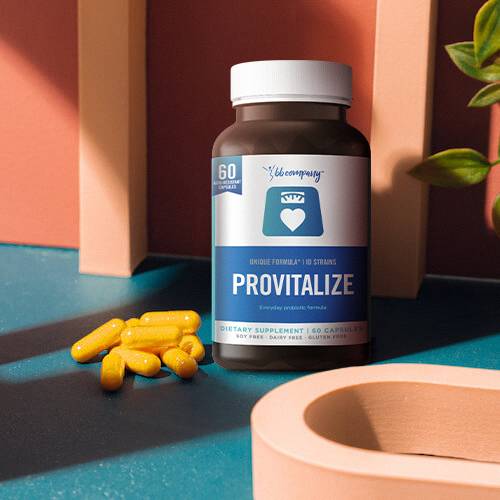
Why we like Provitalize
Provitalize contains 350mg of curcumin and 350mg of moringa leaves per serving.
As we uncovered earlier, curcumin is probably the most effective supplement in tendonitis management because it is able to promote tendon healing, return collagen fibers to their original structure, and offer pain relief.
Likewise, moringa leaves also offer both pain relief and anti-inflammatory support, enabling you to recover quicker.
As curcumin is difficult to absorb, Provitalize has formulated curcumin with bioperine®, a patented version of black pepper extract, which helps to increase absorption by up to 2,000% (however, it’s not recommended if you’re on blood thinners).
In addition to both superherbs, Provitalize also contains 3 anti-inflammatory probiotic strains – L. gasseri, B. breve, and B. lactis, which can help to keep your gut healthy and boost your recovery process.
According to their official website, over 1,200,000 women have tried Provitalize and over 100,000 women subscribe to it monthly. The tens of thousands of glowing reviews on TrustPilot, Amazon, and Okendo are undeniable proof that Provitalize is worthy of our top spot.
Pros
- 350mg of curcumin
- Uses vegan DR CapsTM and bioperine®
- 350mg of moringa leaves
- 68.2 billion CFUs of anti-inflammatory probiotic strains (L.gasseri, B.lactis, B.breve)
- Easy to consume - just 2 capsules a day
- cGMP and Certified Organic
- Clinically studied ingredients
- No caffeine or stimulants
- 100% natural ingredients
- Vegan, keto, paleo friendly
- 13,922+ 5-star Amazon ratings
- 4.6 Star Google rating
- 4.3 Star Trustpilot rating
- Independently verified by Eurofins Testing Laboratory
- 90 day money-back guarantee
Cons
- Sold exclusively online at the time of publication
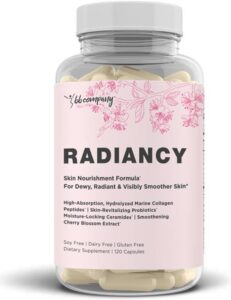
Radiancy contains 2500mg of marine collagen complex (types I-IV) and 30mg of hyaluronic acid – 2 effective supplements for tendonitis recovery.
Hyaluronic acid has been clinically studied many times for its anti-inflammatory and wound healing properties, while marine collagen also saw impressive improvements in tendonitis recovery among 20 participants in a clinical study.
Radiancy is currently marketed for its skin and hair benefits (which are common benefits of collagen consumption), but we think it has the potential to be an effective supplement for tendonitis recovery due to its unique formulation.
Pros
- Contains 2,500mg of marine collagen complex (types I-IV)
- Contains 30mg of hyaluronic acid
- cGMP and Certified Organic
- 100% natural and safe ingredients
- Vegan, keto, paleo friendly
- Clinically studied ingredients
- Independently verified by Eurofins Testing Laboratory
- 90 day money-back guarantee
Cons
- Sold exclusively online at the time of publication
- Marketed as a skin and hair product
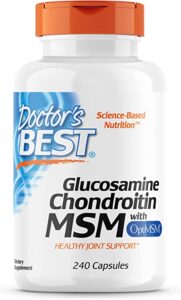
Doctor’s Best MSM contains 1,000mg of MSM, 1,200mg of chondroitin sulfate, and 1,500mg of glucosamine sulfate 2KCI per serving.
Doctor’s best MSM is purified to make sure it’s in the most bioavailable form for your body. This helps manage any tendon swelling faster.31
This formulation also has hyaluronic acid to double down on that swelling.32
The four-stage purity process helps remove any heavy metals and leaves you with a high-quality supplement you can trust.
Pros
- Contains 1,000mg of MSM
- Contains 1,200mg of chondroitin sulfate
- Contains 1,500mg of glucosamine sulfate 2KCI
Cons
- May interact with medications taken for diabetes or glaucoma and with warfarin
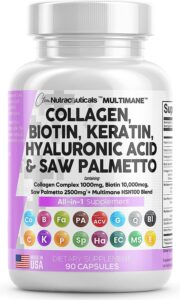
There are 18 ingredients packed into this single supplement. It contains 1,000mg of collagen complex (types I, II, III, and V) and 500mg of “Multimane Keratin Blend”, which comprises pumpkin seed, keratin, hyaluronic acid, and MSM.
Like any health supplement, Clean Nutraceuticals has a fair number of fans and critics. Some customers reported pain relief.
Similar to the supplements listed here, this is also manufactured in a certified GMP facility.
Pros
- Contains 1,000mg of collagen complex (types I, II, III, and V)
- Contains 500mg of "Multimane Keratin Blend", which comprises pumpkin seed, keratin, hyaluronic acid, and MSM
Cons
- May take 6 months to see results
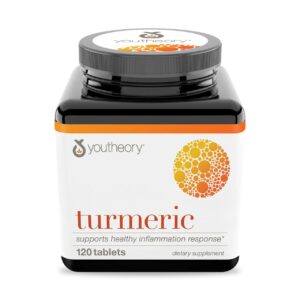
This extra strength turmeric extract is loaded with pure curcumin. Bioperine is added to the formulation to help your body absorb the supplement more efficiently.
Curcumin may help with the swelling and stiffness from tendonitis.36
This is a curcumin supplement and it doesn’t contain any other ingredients.
However, it does contain an emulsifier and additive, which we wish it hadn’t.
Pros
- Contains 1,000mg of turmeric
- Contains Bioperine®
Cons
- Contains food additive and emulsifier
OR
Final Thoughts
Tendonitis is a painful but also common condition, especially among women over 40.
No matter which type of tendonitis, rest can help. So can supplements, especially if you wish to prevent reoccurrence.
We recommend curcumin and hyaluronic acid for the strongest studies supporting tendon recovery.
Supplements are generally safe for long-term consumption, but to be sure, we recommend picking supplements that don’t contain any additives, fillers, and emulsifiers.

Janelle Barowski, MSN, RN
Health and wellness writer
As a registered nurse, Janelle is passionate about client education and public health. She strives to break down complex medical concepts into an approachable format for her audience
Our Main Sources







